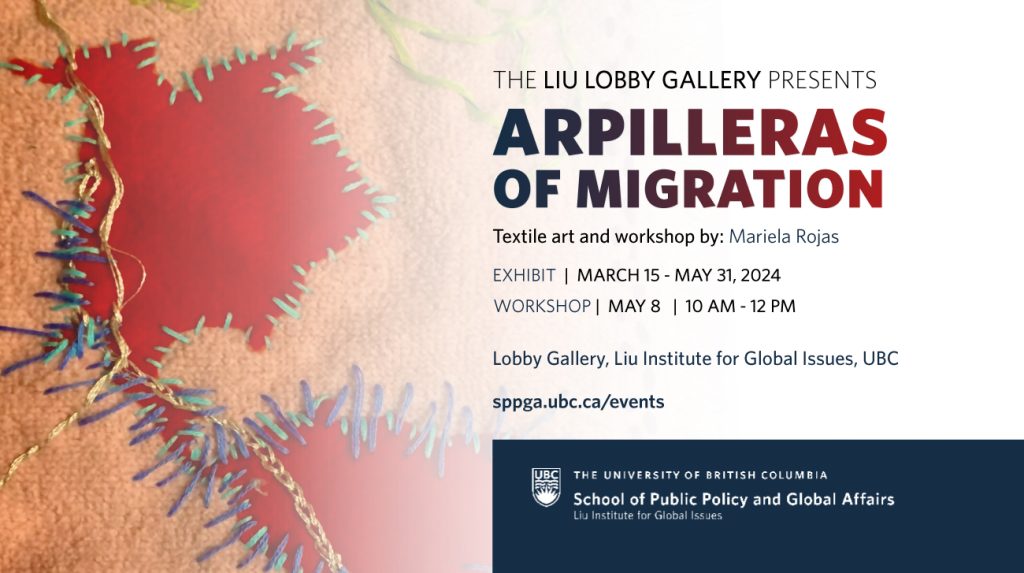

The Liu Lobby Gallery presents a textile art exhibition featuring “arpilleras” artwork and workshop by Mariela Rojas Farias.
Exhibit: Mar 15 – May 31, 2024
Workshop: May 8
Join us on May 8, 2024 at 10:00 am to take part in an arpillera making workshop. Supplies will be available for attendees who would like to participate in creating a small arpillera with the guidance of the artists.
About the Exhibit:
My work is a bridge to communicate and share, collaboratively and respectfully, the experiences of marginalized groups, particularly women and children. The narratives of their everyday struggles and many dreams to thrive in unjust and oppressed capitalist urban settings are part of my research. My work is informed by feminism, post-humanism, critical pedagogy, and social justice art education. These theoretical approaches have helped me understand the world and make visible the non-official narratives we, women, share today.
This project, called Arpilleras of Migration: an a/r/tography about female Latin American resilience, was the thesis I developed and recently defended at the Department of EDCP at the Faculty of Education under the supervision of Professor Rita Irwin, at the University of British Columbia.
The term “arpillera” originates from the Spanish word for sackcloth, the fabric traditionally used for storing staples like flour and potatoes. In Chile, arpilleras have deep roots in folk art, with images created through embroidery while adding recycled rags. However, during the harsh years of the dictatorship (1972-1989), their purpose transformed. As political activists, dreamers, students, workers, and even high school students were abducted, their relatives sought answers at hospitals and police stations in the capital. The Vicariate of Solidarity, affiliated with the Catholic Church, initiated workshops to teach these women the art of arpilleras. Over time, inspired by this textile protest art, women’s groups have continued to create artworks that address global crises, including femicides, child abuse, and environmental degradation. They voice their collective struggles by perpetuating the silent and maternal tradition of sewing, mending, upcycling, and repurposing. Furthermore, since the 2019 social uprising in Chile, textile protest art has become even more prevalent in the streets. This unique form of expression provides a powerful means for women to share their stories, advocate for change, and convey the unspoken truths of their collective battles.
The participant in my research and I manufactured these specific arpilleras during the development of my research between 2021-2022.
Biography
Mariela Rojas Farias is a Chilean artist, teacher, and researcher based in the ancestral and unceded territory of the Coast Salish peoples – sḵwx̱wú7mesh (Squamish), sel̓íl̓witulh (Tsleil-Waututh), and xʷməθkʷəy̓əm (Musqueam) nations. Her multifaceted career transcends the boundaries of art and education.
With a B.A. in English Language and Linguistics and a B.A. in Visual Arts from the Universidad de Chile, Mariela’s creative talents encompass textile, ceramics, sculpture, and mixed media. Her works invite viewers into a world of vibrant colours, shapes, and textures that evoke deep emotions.
Mariela’s artistic exploration extended to the literary realm, earning her a Master of Arts in General Literature. Her thesis, “Life Nonsense in the Postmodern Paradigm,” offers an insightful deconstruction of human experiences within narratives, enriching her artistic approach.
Committed to education, she obtained a Master of Arts in Arts Education from the University of British Columbia, emphasizing the empowering role of art. Mariela passionately believes that art fosters self-expression and resilience.
The exhibit is free and open to the public during regular building hours, 9am – 5pm. It is located in the Lobby on the first floor.
Curated by Fabiola Vizcardo.


